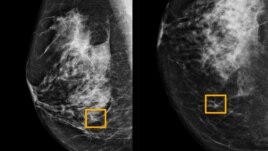06 January 2020
A Google artificial intelligence system was as good as expert radiologists at discovering which women had breast cancer in a new study. The system made the findings from thousands of mammogram images, researchers in the United States and Britain reported.
This is the newest study to show that artificial intelligence, or AI, may improve the accuracy of mammograms. Breast cancer affects one in eight women around the world. The study was published in the journal Nature.
The American Cancer Society says radiologists miss about 20 percent of breast cancers in mammograms. And many women who get the tests have a false positive result at some point. A false positive result shows a woman with cancer even though she does not have it.

A yellow box indicates where an artificial intelligence (AI) system found cancer hiding inside breast tissue, in an undated photo released by Northwestern University in Chicago, Jan. 1, 2020.
The findings of the study were developed with DeepMind AI, which joined with Google Health in September.
The study results represent a big step toward the possibility of early breast cancer detection, said Mozziyar Etemadi. He is one of the study writers and based at Northwestern Medicine in Chicago.
The team included researchers at Imperial College London and Britain's National Health Service. Together, they trained the AI system to identify breast cancers on tens of thousands of mammograms.
They then compared the AI system's performance with the actual results from a set of 25,856 mammograms in the United Kingdom and 3,097 from the United States.
The study showed the AI system could identify cancers with a similar level of accuracy to expert radiologists. At the same time, it reduced the number of false positive results by 5.7 percent in the American patients and 1.2 percent in the British patients.
It also cut the number of false negatives, where tests are wrongly listed as normal, by 9.4 percent in the American group, and 2.7 percent in the British group.
These results show differences in how mammograms are read. In the U.S., only one radiologist reads the results and the tests are done every one to two years. In Britain, the tests are done every three years, and each is read by two radiologists. When they disagree, a third radiologist reads it.
Seeing the signs
In a separate test, the researchers put the AI system against six radiologists and found it performed better at correctly detecting breast cancers.
Connie Lehman is chief of the breast imaging department at Harvard's Massachusetts General Hospital. She said the results agree with findings from many groups using AI to improve cancer detection in mammograms, including her own work.
The idea of using computers to improve cancer detection has been around for years. And computer-aided detection or CAD systems are common in mammography health centers, but CAD has not improved performance in health practice.
The issue, Lehman said, is that current CAD programs were trained to identify things human radiologists can see. But with AI, computers learn to find cancers based on the actual results of thousands of mammograms. So AI has the possibility of going beyond human ability to identify small signs the human eye and brain cannot.
Mozziyar Etemadi added that the study has shown, in tens of thousands of mammograms, that AI can "make a very well-informed decision."
A few limitations
The study has some limitations. Most of the tests were done using the same type of imaging equipment, and the U.S. group had a lot of patients with confirmed breast cancers.
Importantly, the team has not yet shown that the tool improves patient care, said Dr. Lisa Watanabe. She is chief medical officer of CureMetrix, a company whose AI mammogram program won U.S. approval last year.
She noted that AI is only helpful if it creates noticeable progress for radiologists.
Etemadi agreed that those studies are needed, as is regulatory approval, a process that could take many years.
I'm Alice Bryant.
Reuters News Service reported this story. Alice Bryant adapted it for Learning English. Hai Do was the editor.
_______________________________________________________________
Words in This Story
radiologist – n. a doctor whose expertise is using some forms of radiation (such as X-rays) to diagnose and treat diseases
mammogram – n. a photograph of a woman's breasts made by X-rays
accuracy – n. the quality of having no errors or mistakes
detection – n. the act or process of discovering, finding, or noticing something
false positive – n. a test result which incorrectly indicates that a particular condition is present
false negative – n. a test result which incorrectly indicates that a particular condition is absent